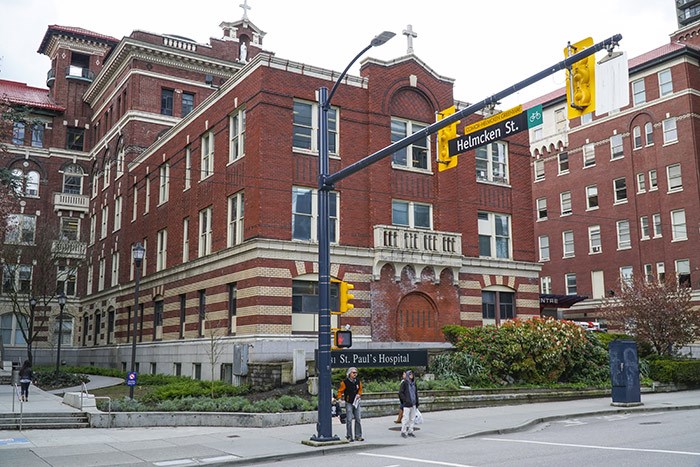 St Paul’s Hospital. Photo Shutterstock
St Paul’s Hospital. Photo Shutterstock
Two incidents in British Columbia have renewed a debate about whether faith-based health institutions that receive public funding should be allowed to opt out of offering medical assistance in dying.
Documents obtained through a freedom-of-information request by the advocacy group Dying With Dignity Canada show that Providence Health Care, a Catholic health care provider, apologized to Â鶹´«Ã½Ó³»General Hospital for a mismanaged transfer of a frail patient seeking assisted death.
"I want to convey my sincere apology for the issues that arose in the transfer," wrote David Unger, then-director of ethics services at Providence in an email on May 18, 2017. "This was a foreseeable and preventable issue for which I accept full responsibility as the director of ethics."
Emails written by Providence staff say the man was at risk of losing his capacity to consent to an assisted death if he was not transferred quickly from St. Paul's Hospital. The man requested an assisted death on a Saturday, but necessary documentation was not filled out until Wednesday, an email says.
When he arrived at Â鶹´«Ã½Ó³»General, there was no bed available, and when a bed was found, it was not appropriate, an email says. It took another hour before an appropriate bed was found, it adds.
An apparent miscommunication by St. Paul's resulted in the delivery method for "a commonly used palliative care medication" not being ready when the patient reached Â鶹´«Ã½Ó³»General, said Providence spokeswoman Elaine Yong, although she said she could not elaborate due to privacy concerns.
Christopher De Bono, vice-president of mission, ethics, spirituality & indigenous wellness at Providence, said 58 patients have asked to talk about assisted death and 17 have received transfers of care.
Since the incident last spring, the organization has established a new assisted-death policy that provides clear guidelines for arranging a transfer. It has also created a new position called the "medical assistance in dying response lead" who assists staff when a patient makes a request, said De Bono.
Shanaaz Gokool, CEO of Dying With Dignity Canada, said it's unacceptable in 2018 for institutions to refuse to provide a "basic and essential" health care service.
"It creates a system of forced transfers for some of the most vulnerable people in our country and people who are often very physically compromised," she said.
Gokool said while she supports the rights of individual doctors to make choices based on conscience, it's not appropriate for entire institutions to claim they are doing so, when there may be doctors within these facilities who support medically assisted death.
The B.C. Health Ministry said that under an agreement with the Denominational Health Association, faith-based facilities are not required to provide services that are inconsistent with their religious mission. There are no plans to terminate this agreement, it said in a statement.
In a separate case, Louis Brier Home and Hospital, a Jewish long-term care home, filed a complaint with the College of Physicians and Surgeons of British Columbia against Dr. Ellen Wiebe for helping one of its residents die, in contravention of the facility's policy.
The complaint that Wiebe provided to The Canadian Press says she failed to communicate with the man's nursing staff, who didn't know Wiebe had completed the procedure until "well after" it had been done.
Wiebe said she gave the patient medical assistance in dying after assessing him and concluding he met the eligibility criteria required by the law, and she did her best to honour his wishes and those of his family.
"It makes no sense that publicly funded facilities can have a few people that have certain views and then force their residents to abide by their ideas," she said.
David Keselman, the home's CEO, was not available for an interview on Tuesday.
The College of Physicians and Surgeons said the complaints process is protected under privacy laws. If an investigation leads to formal discipline, this information is published on the college website.
Robert Breen, executive director of the Denominational Health Association of B.C., said while patients have the right to ask for assistance in dying, they don't have the right to force a doctor to go against their religious beliefs and perform it.
All 44 faith-based facilities his organization represents are doing everything they can to respect the rights of individuals who request assisted death and provide them with the best possible care, he said.
"Nobody gets abandoned. Nobody gets ignored. Nobody gets lesser treatment because they have chosen to do that," he said.
"Everybody is cared for in the same way until they reach that point in our facilities that say, 'We can't do it here,' ... when the transfer happens."
— Follow @ellekane on Twitter.
![]()


